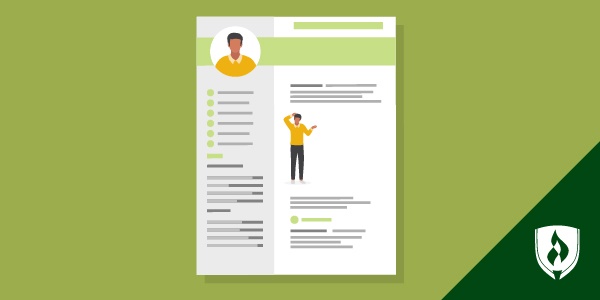
When you first dreamed of starting a new career, your biggest concern was how you’d manage the coursework and build good study habits. Now that you’re well on your way to entering the workforce, there’s a new concern in view: acing job interviews.
The good news is that with the right preparation, you’ll be just fine in most interview settings. But what about challenging interview questions that are tricky to prepare for? Some difficult questions may simply be ones you didn’t prepare for, while others are purposely designed to knock you off balance.
Not to worry! We spoke with Rasmussen University Career Services advisor Heather Kienast to learn the best strategies for fielding these tricky questions.
7 Strategies for responding to challenging interview questions
There’s no one-size-fits all formula for brilliantly responding to tough interview questions. Different strategies will work best for different situations.
Read through these strategies, and take action on them now, before you’re in the hot seat. This will give you the best chance at acing your interview, no matter which questions are thrown your way.
1. Rely on your resume
One of the sneakier challenging interview questions isn’t a question at all. In fact, it’s likely to be the first thing an interviewer says after you sit down in their office: “Tell me about yourself.”
It’s easy to get started talking about your spouse, kids or hobbies, but Kienast says this is a common mistake. What employers are looking for is information about your professional self—your career trajectory and what excites you about the field in general and their company in particular.
Instead of rambling, use your resume as an outline to keep yourself on topic. “Talk about your professional experiences and what led you to where you are now. Discuss why you have the education that you do or even why you are currently continuing your education. Explain your passion for your career field and why you are excited to be interviewing for the position,” Kienast says.
2. Explain how you’re working to improve your skills
“What do you consider to be your biggest weakness?” just might be the interview question job candidates dread most. Don’t be afraid of acknowledging your weaknesses. Everyone has them, and it will look phony if you try to choose a positive “weakness,” like being too early to meetings or working too hard.
Instead, think carefully about which weakness you’ll talk about before you walk into the interview. “I strongly recommend not using an example of a skill that could significantly compromise your position,” Kienast says. Instead, focus on a skill that many people struggle with, such as public speaking or delegating tasks.
Next, focus on your commitment to improving any skills that are lacking. “An employer wants to know that you are open to continuous improvement as a professional,” Kienast says. Use a concrete example of what you’re currently doing to improve a skill that you consider a weakness, such as creating a new scheduling system for yourself if you struggle with time management.
3. Do your research
Questions about salary expectations can be awkward to answer. It’s important to approach the money question with confidence and professionalism, and that means doing your research beforehand.
“You need to have a good understanding about what the average earnings are for the position that you are interviewing for in the area that you live and work,” Kienast says. Use respected national resources like the Bureau of Labor Statistics’ Occupational Outlook Handbook to get started. Then narrow the field down to your specific location by using data analysis sites, like Salary.com or Payscale.com.
Kienast suggests presenting your expectation as a salary range. The goal is to appear both informed and flexible when it comes to pay, keeping in mind other benefits, like vacation time and healthcare. Kienast offers this script for you to practice:
“If you are interviewing for an entry-level position and the research shows that the median starting salary is around $38,000, then you might state, ‘Based on my research and being newer to the field, my expectation is to start somewhere around $37,000 to $42,000 annually, but I am certainly open to conversation based on the entirety of the compensation package.’”
4. Focus on the familiar
It’s a nightmare situation: The interviewer asks a technical question, and you don’t know the answer. How can you be truthful while still showing your competence?
“Relate your response to something that you are familiar with,” Kienast says. For example, if an employer asks about a specific type of software you’ve never worked with, be honest about your lack of experience while also sharing your familiarity with similar software.
You can also put a positive spin on tricky technical questions by emphasizing your willingness to learn and your commitment to gaining new skills and growing as an employee. Phrases like “I’m confident that with a bit of training, I can pick up on [this subject] in no time” are professional and reassuring to employers.
Additionally, it can help to walk through your thought process when asked a challenging technical question. Letting the interviewer know you’re not sure but you know where to look for more info isn’t necessarily a bad look—managers value employees who at least show they can take initiative and find answers on their own.
5. Show off your ability to compromise
“How have you handled a conflict with a coworker or supervisor in the past?” Conflict resolution questions like this are challenging because you don’t want to paint yourself in a bad light, but you also don’t want to come across as the type of person who casts blame on others.
Kienast reassures us that interviewers expect disagreements to arise in the workplace, and they’re genuinely interested in how you handled the situation. “Employers want to know that their employees have the ability to communicate, compromise if needed and come to a resolution without negatively impacting the successful progress of work.”
The “right answer” here is simple: Tell the truth, and choose a story that ends on a positive note and did not require a manager’s intervention. Employers are looking for new hires who can resolve their own conflicts through problem-solving skills and good communication.
6. Slow down
Some tricky interview questions might have you stumped. Many people begin rambling when they aren’t sure of what to say, but Kienast advises asking for a moment to think rather than rushing into a nonsensical response.
“The expectation is not that the candidate has an immediate, concise response to every question,” Kienast says. “This is really about testing communication abilities and decision-making skills.”
Kienast’s advice is to repeat the question, ask for clarification if you need it and then take a moment to gather your thoughts. It may be uncomfortable to sit in silence while you think, but you’re more likely to come up with a professional response.
7. Practice, practice, practice
Most of these strategies require research and forethought before you meet with your potential employer. The more you practice, the better prepared you’ll be—and the better the chances you’ll impress your interviewer.
“Overall, it is best to practice, practice and practice responding to interview questions that could potentially be difficult to answer,” Kienast says. Beyond doing research and preparing responses, make sure you practice speaking your answers out loud to another person.
“Mock interviewing with a career advisor or another professional, researching websites for best ways to respond to certain questions and writing out your responses on paper and reading them out loud to yourself are all great ways to prepare for an interview,” Kienast says.
Ready to land your dream job?
You’ve come this far—now don’t let challenging interview questions stand in your way. You’re not on your own as you prepare for interviews. The Career Services team at Rasmussen University is ready and waiting to help you pursue your dream job.
That’s not the only support available to you as a Rasmussen University student! Make sure you’re taking advantage of all the resources we offer with our article, “9 Surprising Student Resources You Didn’t Know Rasmussen University Offered.”




